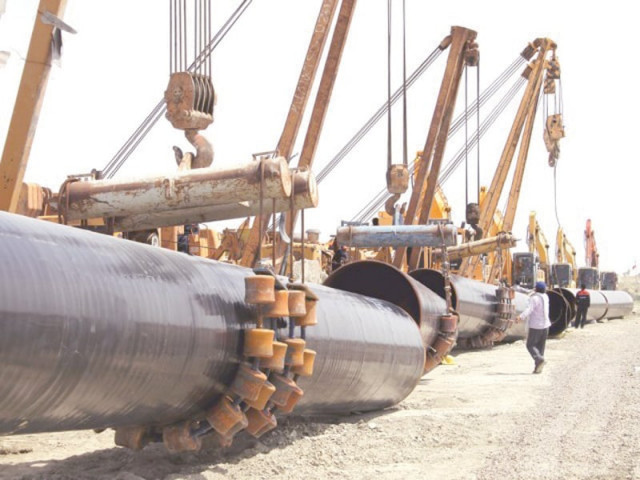Gas import: Qatari team coming, govt to bargain over LNG price
PM will be in Iran to seek extension in deadline for IP pipeline.

The IP project has been stalled in the wake of threat of US sanctions and gas import from India also looks unfeasible as Delhi is seeking a higher price of $21 per million British thermal units. PHOTO: FILE
A Qatari delegation is arriving here at the weekend to negotiate the liquefied natural gas (LNG) price and press ahead with a government-to-government gas supply deal, a project that has full backing of the United States.
The visit, due on May 11, is significant as it comes at a time when Prime Minister Nawaz Sharif will make a trip to Tehran to discuss, among other issues, extension in the deadline for constructing the Iran-Pakistan (IP) gas pipeline to avert hefty penalties, sources say.
The US is fiercely opposed to the IP pipeline due to nuclear standoff with Iran, pressing Pakistan to shelve the project and instead focus on bringing LNG supplies from Qatar and natural gas import from Turkmenistan.
In earlier negotiations, Qatar had asked the PML-N government to set up an LNG terminal before striking a supply deal. Responding to the suggestion, the government awarded a terminal contract to Elengy Terminal Pakistan Limited (ETPL), a subsidiary of Engro Corp, which would build the facility in 11 months.
“With the commitment to setting up the terminal, we have cleared the way for importing LNG from Qatar,” an official said.
At present, the government is considering different supply sources including the IP pipeline, Turkmenistan-Afghanistan-Pakistan-India (TAPI) gas pipeline and LNG import from Qatar and India.
The IP project has been stalled in the wake of threat of US sanctions and gas import from India also looks unfeasible as Delhi is seeking a higher price of $21 per million British thermal units (mmbtu). “Now, the immediate choice for Pakistan is to opt for Qatar LNG,” the official said.
According to officials, the government is also working on the option of LNG import through competitive bidding if talks with Qatar do not reach a conclusion. Apart from this, it will also go for spot LNG purchases as Pakistan State Oil (PSO) is already following this model in oil supplies.
In an earlier visit in January, a delegation of Qatargas comprising Abdullah Ahmad Al Hussaini and Hamad Abdul Aziz Al Mahanadi held preliminary talks with senior officials of the Ministry of Petroleum and Natural Resources, Inter-State Gas Systems, Sui Southern Gas Company and PSO.
The delegation showed flexibility and was willing to consider reducing the price further to help Pakistan tackle energy shortages.
In meetings with officials of the previous PPP-led government, Doha had offered to export LNG at a price equivalent to 14.7% of Brent crude oil rate when it was hovering around $110 per barrel in the international market.
Later, it pushed the price down to $17.437 per mmbtu, a 0.5% discount over the previous rate of $18.002 for the 20-year lifetime of the project.
The price did not cover capital cost of LNG terminal and its charges, import expenses, re-gasification, wastage and shipping costs. The additional costs would add about $2.084 per mmbtu to the quoted price.
Though the cabinet had given the go-ahead to Sui Southern Gas Company to purchase LNG from Qatar, but it did not approve the offered price.
The government is eager to buy 200 million cubic feet of LNG per day (mmcfd), which will be re-gasified at the terminal being set up by ETPL at the Port Qasim and later injected into the system. In the second phase, the volume will be increased up to 400 mmcfd.
The government is interested in importing two billion cubic feet per day in the next two-and-a-half years. Qatar has assured Pakistan that it has enough gas, but it is yet to commit any volume.
Published in The Express Tribune, May 9th, 2014.
Like Business on Facebook, follow @TribuneBiz on Twitter to stay informed and join in the conversation.



















COMMENTS
Comments are moderated and generally will be posted if they are on-topic and not abusive.
For more information, please see our Comments FAQ